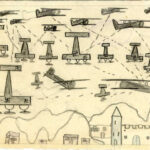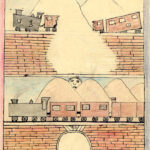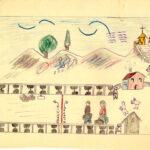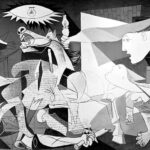Lesson Plan
| Title | Children Reflect on Civilian Bombing in Spanish Civil War |
| Subject | World History, Contemporary Issues, European History, U.S. History |
| Grade(s) | 9-12 |
| Standards | CCSS.ELA-Literacy.RH.9-10.9, CCSS.ELA-Literacy.RH.11-12.7 |
| Number of periods | Approximately two, 45-minute class periods |
| Author credits | |
| Keywords | Fascism, Nazism, Guernica, Geneva Convention |
| Essential questions | How did targeting civilians in war change the human rights movement? |
| Synopsis | This lesson examines the reaction of children in Spain to terror bombing of cities by the German Luftwaffe supporting Franco. |
| Standard Alignment(s) used | Common Core English Language Arts Standards (Literacy in History/Social Studies, grades 9-10 and 11-12) |
| Recommended Teacher Background | The Spanish Civil War is a pivotal point in the emergence of 20th century war tactics. For teachers and students who want more detailed background of the causes and consequences of the Spanish Civil War, watch the 10- or 40-minute introduction to the Spanish Civil War among the ALBA teacher resources. |
| Connection to other disciplines | English Language Arts, U.S. Government, European History, U.S. History |
| Number of class periods | Approximately two, 45-minute class periods |
Standards
| Objectives | Standards addressed |
| Compare and contrast treatments of the same topic in several primary and secondary sources. | CCSS.ELA-Literacy.RH.9-10.9 |
| Integrate and evaluate multiple sources of information presented in diverse formats and media (e.g., visually, quantitatively, as well as in words) in order to address a question or solve a problem. | CCSS.ELA-Literacy.RH.11-12.7 |
Primary Sources
- Children’s drawings from the Spanish Civil War; “Guernica” by Pablo Picasso
- Excerpts from the following:
- Geneva Convention of 1949
- U.N. Universal Declaration of Human Rights
- Statement of the International Criminal Court
- Personal letter of Spanish Civil War veteran Boleslaw “Slippery” Sliwon
Secondary Sources
Related resources
Procedures
- Pre-assessment and activation of prior knowledge: Introduce and/or review with students the reasons why civil war broke out in Spain. Then introduce or review the purpose of the International Committee of the Red Cross and the early (up to 1929, excluding 1948-49) Geneva Conventions.
- Step by Step:
Day One:
- Lead-in/hook: Discuss the role that images, particularly photographs and art, serve in the communication of historical events. What famous images do students recall that told part of a historical story? What are the advantages and disadvantages of using images as historical sources? What would be the advantages and disadvantages of using images as evidence against perpetrators of atrocities, or against leaders of governments who in some way violated the Geneva Convention?
- Pass out one image from Appendix 1 to each group. Explain to students that these visual sources represent never-before-experienced elements of warfare that took place during the Spanish Civil War. Three were drawn by Spanish children, one by a Spanish artist. In their groups ask them to complete the following:
- Take inventory: Working alone without collaborating, ask them to write down in list form everything they see in the image without overlooking a single detail (they don’t know what might be important later). Focus only on description, not on meaning.
- Compare: Ask students to share their detailed list with other members of their small group, making note of details they may have overlooked. Again, focus only on description.
- Summarize: Ask students to work alone to write a three-sentence paragraph summarizing the “event” shown.
- Interpret: Ask students to (in a few sentences) describe the possible ideas and emotions of the artists and their reasons for drawing/painting their pictures. What was their intended audience and how might that determine the purpose of the drawing/painting? What was the “tone” of the author? (Does the author seem to be expressing anger, sadness, fascination, or other emotions?)
- Compare: Have students share their paragraphs.
- Hypothesize: In their small groups, ask students to consider the following question: How did warfare change during the Spanish Civil War?
- Still in small groups, ask students to imagine that they are on a committee to draft new articles to update the Geneva Convention. Draft three or four specific articles as if they were authors of an updated Geneva Convention. Share the articles.
Closure: Discuss with students how the tactics of war used in the Spanish Civil War were again used by both the Allies and Axis powers during World War II. The bombing of cities and the Holocaust created a post-war urgency to create new, binding, human rights provisions to guide future conflicts. This task was embraced by both the International Committee of the Red Cross and the newly created United Nations. If time, pass out excerpts from the 1949 Geneva Convention, the U.N. Declaration of Human Rights, and the International Criminal Court (Appendix 2). Ask students to compare and contrast the articles they wrote with the articles of the first two documents. Ask students if they believe it is necessary to have an international court. Why or why not? (Teachers can discuss that the U.S. in the last two decades has refused to ratify participation in the International Criminal Court. Outright rejection or limited cooperation by the U.S. has been for various reasons, including the belief that the court is a threat to U.S. sovereignty, and that Americans could be accused of crimes for political rather than human rights reasons.)
Differentiation:
- Advanced:
- Students can research other agencies that draw attention to human rights violations, including Human Rights Watch, Amnesty International, Human Rights Action Center, Simon Wiesenthal Center, and the National Association for the Advancement of Colored People.
- Students can research controversial U.S. government activity, including waterboarding and rendition, and whether or not these actions by the U.S. government constitute human rights violations.
- Students can research the online documents pertaining to the Nuremberg Trials and describe how testimony and legal decisions from the trials might have impacted the 1948 and 1949 documents, including the distinction between “war crimes” and “crimes against humanity.”
- Struggling: Teachers may want to provide time for vocabulary enrichment beforehand. Possible vocabulary words from the documents: belligerents, accommodate, combatants, repatriated, armlet, interment, internment, incineration, evacuation, emblem, dressing, summons, criteria, mutilations, constituted, judicial, indispensable, inherent, inalienable, barbarous, endowed, servitude, incitement, manifest, impunity, perpetrators, consensus, genocide.
- Additional Topic: Compare visual sources with a written source. See Appendix 3 for an excerpt from a letter to a friend from Spanish Civil War veteran Boleslaw “Slippery” Sliwon, who made personal observations about the bombing of civilians.
Assessment
Summative assessments might include some of the following extended answer prompts:
- Describe the purpose of the Geneva Conventions. Provide _____ examples of specific ways that human rights and responsibilities have been addressed by the conventions.
- Describe the evolution of the Geneva Conventions from 1864 to 1949.
- How have changes in warfare created changes in how we define war crimes?
- How have changes in technology changed how we treat combatants in war?
- What problems and solutions to human rights during wartime were created by the invention and utilization of aircraft in war?
- Do we need a new convention in the 21st century? What changes in warfare are taking place now that might prompt changes to the Geneva Convention (for example, the use of laser-guided missiles and drones, targeted assassinations, or renditions)?
Appendix 1:
Thumbnails link to larger images.
Appendix 2:
Excerpt from Geneva Convention of 1949:
Article 3. (1) Persons taking no active part in the hostilities, including members of armed forces who have laid down their arms and those placed ‘hors de combat’ [out of combat] by sickness, wounds, detention, or any other cause, shall in all circumstances be treated humanely, without any adverse distinction founded on race, colour, religion or faith, sex, birth or wealth, or any other similar criteria. To this end, the following acts are and shall remain prohibited at any time and in any place whatsoever with respect to the above-mentioned persons:
(a) violence to life and person, in particular murder of all kinds, mutilation, cruel treatment and torture;
(b) taking of hostages;
(c) outrages upon personal dignity, in particular humiliating and degrading treatment;
(d) the passing of sentences and the carrying out of executions without previous judgment pronounced by a regularly constituted court, affording all the judicial guarantees which are recognized as indispensable by civilized peoples.
Excerpt from 1948 United Nations “Universal Declaration of Human Rights”:
From the Preamble: Whereas recognition of the inherent dignity and of the equal and inalienable rights of all members of the human family is the foundation of freedom, justice and peace in the world,
Whereas disregard and contempt for human rights have resulted in barbarous acts which have outraged the conscience of mankind, and the advent of a world in which human beings shall enjoy freedom of speech and belief and freedom from fear and want has been proclaimed as the highest aspiration of the common people…
Article 1. All human beings are born free and equal in dignity and rights. They are endowed with reason and conscience and should act towards one another in a spirit of brotherhood.
Art. 4. No one shall be held in slavery or servitude; slavery and the slave trade shall be prohibited in all their forms.
Art. 5. No one shall be subjected to torture or to cruel, inhuman or degrading treatment or punishment.
Art. 7. All are equal before the law and are entitled without any discrimination to equal protection of the law. All are entitled to equal protection against any discrimination in violation of this Declaration and against any incitement to such discrimination.
Art. 18. Everyone has the right to freedom of thought, conscience and religion; this right includes freedom to change his religion or belief, and freedom, either alone or in community with others and in public or private, to manifest his religion or belief in teaching, practice, worship and observance.
“About The Court” – Statement of the International Criminal Court:
The International Criminal Court (ICC), governed by the Rome Statute, is the first permanent, treaty based, international criminal court established to help end impunity for the perpetrators of the most serious crimes of concern to the international community.
The international community has long aspired to the creation of a permanent international court, and, in the 20th century, it reached consensus on definitions of genocide, crimes against humanity and war crimes. The Nuremberg and Tokyo trials addressed war crimes, crimes against peace, and crimes against humanity committed during the Second World War.
On 17 July 1998, the international community reached an historic milestone when 120 States adopted the Rome Statute, the legal basis for establishing the permanent International Criminal Court.
Appendix 3:
Albacete Spain Nov 28, 1937
Dear Comrade Samuel
Oh you must know that I am in the hospital recovering from a physical breakdown, nervous breakdown, yellow Jaundice, at the present I have a minor touch of remuthism in my left shoulder, and a cold not worth mentioning, but since I began coughing while I began to write this letter, it made me do so. At this beautiful seaside health resort, there are some boys you may know… I almost forgot to tell you about our bombing we got the other day. Sitting in a café the other afternoon eating some nice fried fish, there was a loud Booming, I jumped about two feet of my chair and fell on the floor, soon I heard a roar of planes, they flew over the café, with their machine guns strafing the road or street. Good Christ I say, they’re going to blow hell out of us soon, so they circled around went back to the railroad station, and then there was another Boom Boom. They flew low as hell strafing their machine guns at people who were panic stricken, running for shelter, the town being no military value, was not armed with Antiaircraft batters. Doing their bit of demoralizing the population they flew down where all the hospitals are situated and began bombing the railroad tracks, somehow their poor bombmanship, they missed landing their bombs near an orphanage… I hope they never come around again. I have been nervous since my hand shakes like as if I were cold or something. I was getting over a nervous breakdown from the bombing, I was at the front in a hospital, and now I’m back again, nervous. What a sensation to be bombed. When bombs drop near you and the noise grows louder and louder, and the next one it seems like you’re going to be blown to hamburger…
I have figured out a good punishment for people who want war, and those who provoke wars. First take the bastards and put them in a place surrounded by barbed wire so that they can’t crawl out, then have about 100 airplanes fly over the place for a while, low so these bastards could see the bombs. Next on the menu have the little pursuit planes come swooping down with their machine guns rattling, with hot lead dropping around this fence, but not hitting any of these guys for that would be too easy for them at once. After half hour of these little planes, let the bombers come over and drop their load of big bombs but not on the men, no near them so that the noise could be heard, but not touched by shrapnel. After several hours of bombing, let those bastards out, and I guarantee that they would be cured of their War Mongering or any kind of war propaganda, they all would become pacifists. This kind of treatment would be the best, because when they send bombers to bomb children, how could a person be a humanitarian, and let bastards like that get away. Give them some of their own medicine. Many times I went through a village where fascist bombed the people, their faces showed it, sometime I was so mad at the fascists that tears began to run down my cheeks. Dud told me you wanted to know what I thought of war. Quote Slowen, War is something miserable, that cannot be described on paper, tales of war maybe written, but one must be in war to really know what war is and its effects. Those who start wars are not humans, for war become a place where people forget they are humans and fight with no mercy shown, its either you or I that going to exist or both of us shall die. Unquote that my way of saying just how I feel, but I am sorry to say my emotions sometimes run high with hatred or pity. One day some fascists surrendered one had his arm shot off. He was in pain and was thirsty. Sez he to me, Please give me some water. Sure, I answered and gave him the canteen, he took about two swallows, and hand it back to me, he was afraid to drink more. I knew that he was dry so gave him the canteen and told him to drink all the water. Joy swept his face, he gulped down all the water to the last drop. Thanks comrade he said, tears rolled down cheeks with happiness, they were told by the fascist officers that it meant death and torture to be captured, but after they surrender they were happy that they at last were with the loyalist people. This young boy with his shot off arm was rushed to a hospital in our ambulance… With a Salud Boleslaw (Slippery) Sliwon



